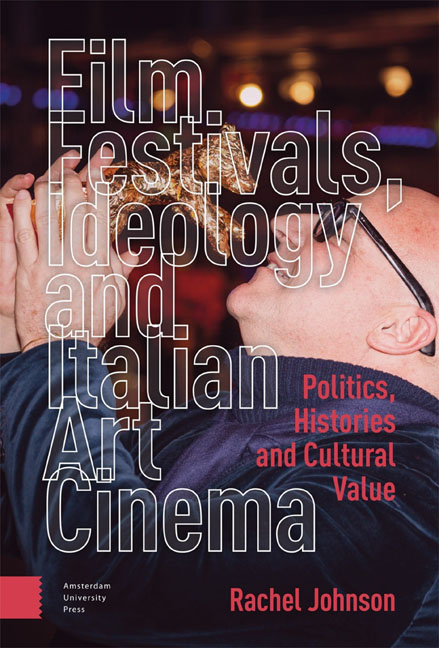3 - Gendering Art: The Great Beauty at Cannes and Tallinn
Published online by Cambridge University Press: 13 April 2024
Summary
Abstract: This chapter examines the universal of “art” and the figure of the auteur in relation to gender. Presenting new data regarding the history of European A festivals’ prize-giving, I respond to the fact that no Italian film directed by a woman has won top prize since and including the first edition of Cannes in 1946. Through an analysis of the book's most celebrated case study, The Great Beauty, I show that Italian women directors’ exclusion is accompanied by film festivals’ implicit gendering of the notions of art that they promote. This chapter responds to recent challenges to cinematic institutions’ gender discrimination (e.g., the #MeToo movement), countering notions of artistic universality with theories of male gaze and sexual difference.
Keywords: male gaze, art cinema, Italian cinema, film festivals, Paolo Sorrentino, feminism
In a giant loft apartment in central Rome, a wild party rages on all night long—it's Jep Gambardella's (Toni Servillo) 65th birthday. Jep is the symbol of Roman decadence. In the foot-steps of the Jesuits and the Medicis, he knows more about people's lives than he should and enjoys his influence in the marble gardens of the capital like some autocrat of old. Yet this birthday constitutes a symbolic confrontation with mortality that sends Jep (and us, along with him) on a dream-like tour of Rome's past and present through Jep's memories, passions and crumbled dreams.
“Great Beauty” is too aristocratic to deign to adhere to any kind of narrative structure. Instead it offers us a whirlwind adventure that cuts through time and space gallantly, as if through a fine Parma ham. Anyone familiar with Fellini knows how sometimes one must simply surrender to the filmmaker's whims. Whereas Fellini wrote love letters to Rome, Paolo Sorrentino is preoccupied with the decay of the ages that have been deposited under the gilded superficies. This film is at once an ode and an elegy to Rome. Paolo Sorrentino turned 43 this year and he has now given us his finest film.
- Type
- Chapter
- Information
- Film Festivals, Ideology and Italian Art CinemaPolitics, Histories and Cultural Value, pp. 99 - 138Publisher: Amsterdam University PressPrint publication year: 2023



